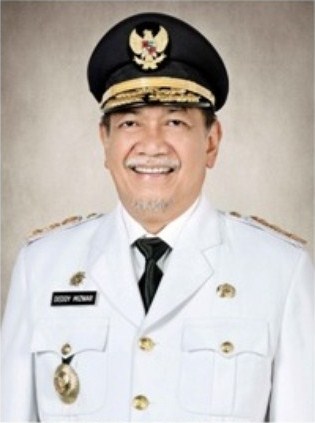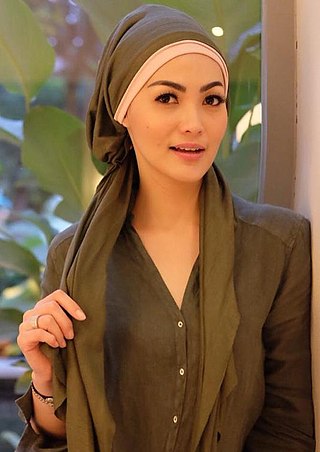
Clueless is an American teen sitcom based on the 1995 film of the same name. It premiered on ABC on September 20, 1996, as a part of the TGIF lineup during its first season. The series then spent its last two seasons on UPN, ending on May 25, 1999. Alicia Silverstone had a development deal with Columbia-TriStar at this time, and was unable to reprise her role from the film.

Terrorism in Indonesia refer to acts of terrorism that take place within Indonesia or attacks on Indonesian people or interests abroad. These acts of terrorism often target the government of Indonesia or foreigners in Indonesia, most notably Western visitors, especially those from the United States and Australia.

Deddy Mizwar is an Indonesian actor, film director and politician, born of an Indo (Dutch-Betawi) father and Betawi-Bugis mother. He is the Chairman of Indonesia's National Film Advisory Board and former Vice Governor of West Java. He also ran for governorship of the province in the 2018 election. His 2010 film How Funny was selected as the Indonesian entry for the Best Foreign Language Film at the 83rd Academy Awards, but it didn't make the final shortlist.
Zaskia Adya Mecca is an Indonesian actress and presenter of Sunda-Aceh-German descent. She is married to movie director Hanung Bramantyo and the oldest sister of an actors Haykal Kamil and Marsha Natika, and a younger sister-in-law of actor Ferry Ardiansyah.
Arizal was an Indonesian film director.
PT MNC Televisi Indonesia, operating as MNCTV is an Indonesian private free-to-air television broadcaster. It was founded on 23 January 1990, at first broadcasting only educational programmes, but has since become similar to other Indonesian TV networks, showing programs such as quizzes, sinetron, reality TV shows, sports shows, newscasts, and recently, dangdut music.

The Citra Award for Best Actor is an award given at the Indonesian Film Festival (FFI) to Indonesian actors for their achievements in leading roles. The Citra Awards, described by Screen International as "Indonesia's equivalent to the Oscars", are the country's most prestigious film awards and are intended to recognize achievements in films as well as to draw public interest to the film industry.
Para Pencari Tuhan is an Indonesian television series created by Deddy Mizwar. The series focuses on a musalla caretaker Bang Jack and people living around him as they learn to practice Islamic value in their lives. It is first aired on 16 September 2007. It is aired only every Holy month of Ramadan, during suhur on 03:00–04:30 WIB in Season 1–6, and 03:00–04:00 WIB in Season 7–present and during iftar on 18:00–19:00 WIB on SCTV. This show also features a Telequiz. As of 2023, the series had 453 episodes across sixteen seasons and had been renewed for the seventeenth. In 2023, it received a record for Longest Continuous Ramadan Religion Series from Indonesian World Records Museum.
Danilla Riyadi, known professionally simply as Danilla, is an Indonesian singer and actress. As a singer she has released two studio albums: Telisik (2014) and Lintasan Waktu (2017); and one EP: Fingers (2019). The reception to her debut album resulted in her being named the 2014's "Best New Act" by Rolling Stone Indonesia.

Chilling Adventures of Sabrina is an American supernatural horror television series developed by Roberto Aguirre-Sacasa for Netflix, based on the Archie comic book series of the same name. The series is produced by Warner Bros. Television, in association with Berlanti Productions and Archie Comics. Aguirre-Sacasa and Greg Berlanti serve as executive producers, alongside Sarah Schechter, Jon Goldwater, and Lee Toland Krieger.

Pretty Little Liars is an Indonesian drama mystery streaming television series directed by Emil Heraldi for Viu. The series is adapted from the American television series of the same name by I. Marlene King, which is loosely based on a series of books by Sara Shepard. The series features an ensemble cast headed by Yuki Kato as Alissa, Anya Geraldine as Hanna, Eyka Farhana/Caitlin Halderman as Ema, Valerie Thomas as Sabrina, and Shindy Huang as Aria. The series also features Wulan Guritno, Tarra Budiman, Naufal Samudra, Jennifer Coppen, Cindy Nirmala, Giulio Parengkuan, Bio One, and Bastian Steel in starring roles. The first season was released on 22 April 2020 with 10 episodes. The second season premiered on 14 April 2022.

Indonesia's Next Top Model is an Indonesian reality television series based on Tyra Banks' America's Next Top Model, which features a group of young women who compete for the title of "Indonesia's Next Top Model" and a chance to begin their career in the modeling industry. The series began to air on NET. starting from November 28, 2020.

The first cycle of Indonesia's Next Top Model aired weekly on Indonesian private broadcaster NET., starting November 28, 2020. Indonesian supermodel and actress Luna Maya and Deddy Corbuzier were added to the panel as the host and creative consultant of the show respectively, while Patricia Gouw and Panca Makmun were added to the panel as judge, catwalk coach, and main model mentor. Ayu Gani and Jesslyn Lim from Asia's Next Top Model were added as model mentors throughout the cycle. This season saw 16 contestants vying for a brand new Honda HR-V and cash amounting to hundreds of millions of Rupiahs.

Fachri Albar is an Indonesian actor and musician. He is best known for starring in Joko Anwar's Neo-noir thriller Dead Time: Kala in 2007 and psychological thriller The Forbidden Door in 2009.

Christy Jusung is an Indonesian film and television actress. She became widely known after playing the character Sabrina in the Ramadan television series Lorong Waktu in the early 2000s.

Aditya Novikasari or better known as Vika Aditya is an Indonesian model, actress and television presenter. She is best knowing for cast as Sabrina in Ramadan television series, Lorong Waktu. She has also been in the top three finalists for Putri Indonesia Yogyakarta.

Lorong Waktu is an Indonesian animated television series with the theme of religion and science fiction produced by CookIt Studio which is the animation division of Demi Gisela Citra Sinema. This series aired on SCTV in May 2019 to coincide with the month of Ramadan 1440 H. This series itself is a loose adaptation of television series with same title which was produced from 1999 to 2006. In the Anugerah Syiar Ramadan 2020 award organized by the Indonesian Broadcasting Commission (KPI), the Indonesian Ulema Council (MUI) and the Ministry of Youth and Sports (Kemenpora), this series won the award for the category "Best Animated Film Program".

Keluarga Cemara is an Indonesian television series which first aired from October 6, 1996 to February 28, 2005. Based on a serialized novel with same title by Arswendo Atmowiloto, the series was originally broadcast on RCTI from 1996 to 2003, and was continued under the title Keluarga Cemara: Kembali ke Asal, which aired on TV7 in 2004 and 2005.
Atas Nama Cinta is an Indonesian television romantic drama series that premiered on 5 June 2023 on ANTV. It stars Jonas Rivanno, Sarah Samantha, Donny Michael and Daniel Rutters in the lead role. The show went off air on 2 July 2023 due to low ratings.
Danella Ilene Kurniawan is an Indonesian model, entrepreneur, and the winner of the first cycle of Indonesia's Next Top Model.

















